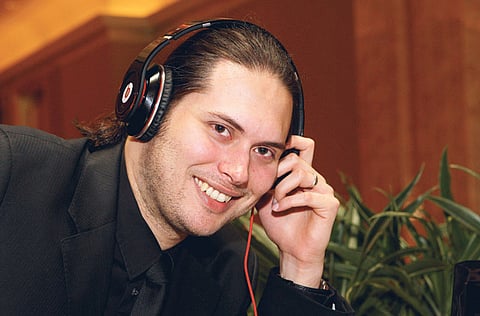Musician ties mathematical technique to Arabic music
Plans to apply same standards used in the West

Abu Dhabi: Skander Ladjimi is passionate about Arabic music. The French national, who is half Swiss and half Tunisian, grew up in a home filled with the sounds of his heritage. And now he is determined to not only find a way to preserve the culturally diverse medium but also to take it to the next level.
"I used to always listen to Arabic music when I was young…I remember watching orchestras on television and pretending I was [a] conductor! But I would always think that even though it is such a rich music, there's something missing…it was only when I went to the International Conservatory in Paris and studied it formally that I discovered the reason why," the Project Manager at the International Conservatory in Paris said.
According to Ladjimi, the different traditional instruments that can be found the region, while a reflection of each county's unique culture, are difficult to harmonise because of the various techniques used to perform their music.
"Arabic instruments have different tuning techniques and so there are certain things that aren't currently possible…unlike Western instruments. What I aim to do is to take the mathematical techniques used to write Western classical music and apply them to Arabic classical music…that way, composers and musicians…will have the tools to express their music to its full potential," Ladjimi explained.
Persistence
He said some musicians discouraged him. "…but I persisted. So far, things look promising and if it works out then for the first time in 400 years, Arabian instruments will be the symphonic equivalent of Western instruments, despite the fact that they are different cultures," Ladjimi added, smiling.
In 2008, the President of the Conservatory discussed the possibility of opening a branch in Abu Dhabi and Ladjimi jumped at the opportunity to not only explore the feasibility of the idea but also to see whether his ideas would be supported in the region.
"A few months later I came here…I didn't know anyone but I discovered that everyone here is so helpful and very open to discussing different ideas, especially now that Abu Dhabi's cultural programme is exploding," he said.
Ladjimi noted that in addition to organisations that had begun to support him, such as the Beit Al Oud, he still plans to approach the Abu Dhabi Authority for Culture and Heritage (Adach).
Proposal
"I hope to submit my complete proposal in November to create a Grand Oriental Orchestra here, complete with musicians and instruments from the Arab World…but I hope to open auditions in September."
Ladjimi said he wants to start performing in 2012. He said it will take him about two years to train everyone on the system.
"…by 2030, I want the orchestra to become completely self-sufficient…to the point where they can perform in Europe and raise greater awareness about the diversity of Arabic music," he added.
The composer admitted that his passion and drive to take Arabic music to a new level has sometimes caused him to lose himself in his work, causing him to appear to be missing in his own home.
"Many composers work at home…I tend to wake up suddenly at 3am inspired and rush to my studio to work on the idea…then I may take a break later in the day…or I stay holed up in there all day until I am satisfied…but my wife has been incredible supportive and patient…even though she knew what she was getting into when we got married. I'm always at home but she never sees me!" Ladjimi said laughing.



